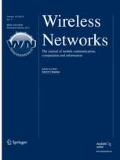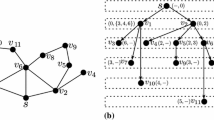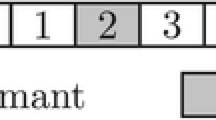Abstract
Energy conservation is a critical issue in ad hoc wireless networks for node and network life, as the nodes are powered by batteries only. One major approach for energy conservation is to route a communication session along the route which requires the lowest total energy consumption. This optimization problem is referred to as Minimum-Energy Routing. While the minimum-energy unicast routing problem can be solved in polynomial time by shortest-path algorithms, it remains open whether the minimum-energy broadcast routing problem can be solved in polynomial time, despite the NP-hardness of its general graph version. Recently three greedy heuristics were proposed in [11]: MST (minimum spanning tree), SPT (shortest-path tree), and BIP (broadcasting incremental power). They have been evaluated through simulations in [11], but little is known about their analytical performances. The main contribution of this paper is a quantitative characterization of their performances in terms of approximation ratios. By exploring geometric structures of Euclidean MSTs, we have been able to prove that the approximation ratio of MST is between 6 and 12, and the approximation ratio of BIP is between 13/3 and 12. On the other hand, we show that the approximation ratio of SPT is at least n/2, where n is the number of receiving nodes. To the best of our knowledge, these are the first analytical results for the minimum-energy broadcasting problem.
Similar content being viewed by others
References
V. Chvátal, A greedy heuristic for the set-covering problem, Mathematics of Operations Research 4(3) (1979) 233–235.
A. Clementi, P. Crescenzi, P. Penna, G. Rossi and P. Vocca, On the complexity of computing minimum energy consumption broadcast subgraphs, in: 18th Annual Symposium on Theoretical Aspects of Computer Science, LNCS 2010 (2001) pp. 121–131.
A. Clementi, P. Penna and R. Silvestri, On the power assignment problem in radio networks, in: Electronic Colloquium on Computational Complexity (2000). Preliminary results in: APPROX'99 and STACS'2000.
T.J. Cormen, C.E. Leiserson and R.L. Rivest, Introduction to Algorithms (MIT Press and McGraw-Hill, 1990).
M.R. Garey and D.S. Johnson, Computers and Intractability: A Guide to the Theory of NP-Completeness (W.H. Freeman, 1979).
S. Guha and S. Khuller, Approximation algorithms for connected dominating sets, Algorithmica 20 (1998) 347–387.
L.M. Kirousis, E. Kranakis, D. Krizanc and A. Pelc, Power consumption in packet radio networks, Theoretical Computer Science 243 (2000) 289–305.
F.P. Preparata and M.I. Shamos, Computational Geometry: An Introduction (Springer-Verlag, 1985).
T.S. Rappaport, Wireless Communications: Principles and Practices (Prentice Hall, 1996).
S. Singh, C.S. Raghavendra and J. Stepanek, Power-aware broadcasting in mobile ad hoc networks, in: Proceedings of IEEE PIMRC'99, Osaka, Japan (September 1999).
J.E. Wieselthier, G.D. Nguyen and A. Ephremides, On the construction of energy-efficient broadcast and multicast trees in wireless networks, in: IEEE Infocom'2000 (2000).
Author information
Authors and Affiliations
Rights and permissions
About this article
Cite this article
Wan, PJ., Călinescu, G., Li, XY. et al. Minimum-Energy Broadcasting in Static Ad Hoc Wireless Networks. Wireless Networks 8, 607–617 (2002). https://doi.org/10.1023/A:1020381720601
Issue Date:
DOI: https://doi.org/10.1023/A:1020381720601




